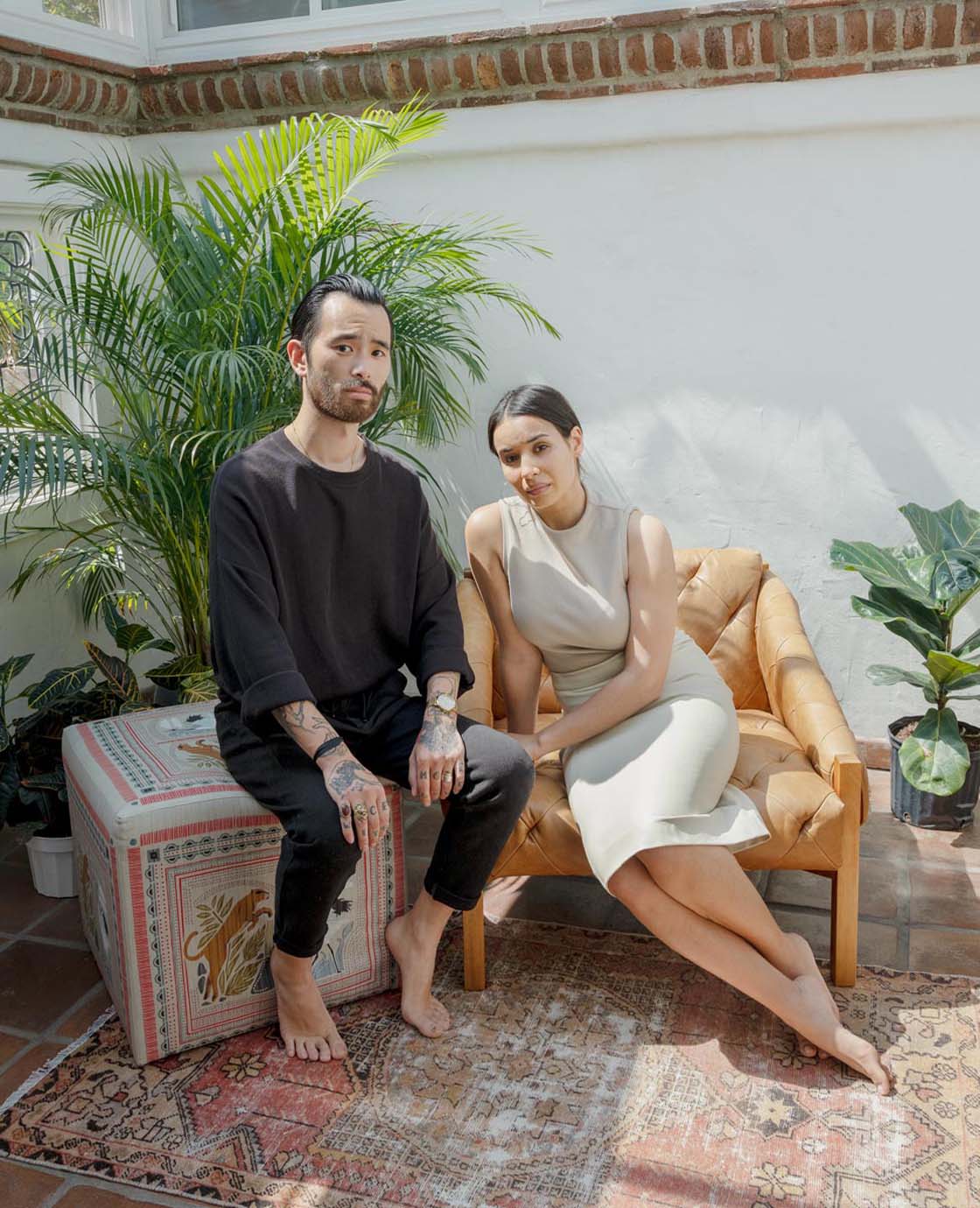
During peak midday sunlight, I drive up into the Hollywood Hills to meet with Sylvia M. Zakhary and Sing J. Lee, the artistic duo behind MAMAG, a creative agency and production company working at the intersection of music, film, art, fashion and technology, with clients like Google Pixel 3, Adidas, and The New York Times—for whom they worked on the mini-series Great Performers. Their enclave is a mix between cozy bed and breakfast, romantic bungalow and production office, with a small crew stationed at edit bays in the living room. After heading up a winding, hobbitlike staircase, we settle into a dreamy sunroom to talk about the good, the bad and the ugly sides of building a relationship and a business. Zakhary founded MAMAG in 2016. When I ask her about the meaning behind the name, she explains, “My nickname growing up was mama ghanoush, like baba ghanoush. As I grew up, I needed to retire that name and I had this idea that the company could carry it.” Lee adds, “There’s hidden meaning—that’s what Sylvia’s about.” Zakhary redirects Lee’s compliment: “That’s what the work is about. Most of our work is a Trojan horse that comes into play in all these spheres of entertainment and music and commercials—worlds where they would normally never allow us to talk about these things. Traditionally and historically, we’re not allowed to have someone like Carrie Mae Weems in a commercially-driven environment and talk the way she talks,” she says, referring to a project they did in partnership with Lyft. In the series, Weems talks with filmmaker Terence Nance about the influences behind their work and their search for authentic black representation in American popular culture. “Normally our brand partners would fight that,” says Zakhary, “but we were fortunate to have her speak her mind. We were in a beautiful position to be able to do that.”
This creative freedom was not exactly easy to come by, but Lee and Zakhary have maintained an intentionality in their casting, crew and narratives that sets them apart from other ad companies. “I’m always afraid to call it an ad agency,” Zakhary admits. “That is essentially what it is, but I don’t always believe—and I’m being frank—that I deserve it, because I’m this small Egyptian girl coming into this world that’s really dominated by white men. Essentially every ad agency is owned by or founded by a white man.”
While the media landscape continues to grapple with institutional and implicit bias, Zakhary and Lee have a love for their work and each other—their love story began on the set of the Migos “Stir Fry” music video—that keeps them in the game for the long haul. Zakhary, who is Egyptian-American, spent her childhood and teen years living across seven different countries, finding her way to New York when she was 18. She hustled her way into a career as an agent and producer using white male pseudonyms to negotiate her own deals. Lee, born in Manchester, England to immigrant parents from Hong Kong, started off as a director and musician and describes his journey into the creative industry as a way for him to understand his identity and feelings, which where complicated growing up “as a person of color who grew up in a 99-percent white town, in an East Asian household with parents who tried to barricade themselves from Western culture and consumerism.” His marginalization fueled his exploration into subcultures like the British punk scene. “The Clash is such an important group to me,” Lee says. “Not just because of their music, but more so because of the way they held themselves. They didn’t see themselves as musicians. They saw themselves as public service announcements with guitars.”
Now with MAMAG, Zakhary and Lee work similarly to provide both a service and a message. Their work on projects such as the Dreamweavers artist interview series that Swizz Beatz made in collaboration with UTA Artist Space, their Adidas campaign with Donald Glover, and their forthcoming work with Amazon Music Rap Rotation all offer powerful messages, raising the question of why we haven’t seen this before. Both are excited about the groundbreaking new partnership with Amazon in which they are able to shape the company’s entry into a hip-hop cultural space. Zakhary explains, “It’s so nice to know that brands know we are here for that. We make it easy for them to partner with us and speak authentically about culture, and we make sure they understand how the voices of marginalized people and people of color can help drive brands further. On a business level, we, as people of color, have such huge buying power and companies are starting to recognize that.”
In 2018, the duo expanded their brand with the launch of MAMAG Creative Studios, which focuses on bridging the gap between culture and commerce. And beyond marriage and scaling their business, giving back is one of MAMAG’s biggest priorities. As Zakhary says, “Secretly this has always been about creating opportunities for people who wouldn’t otherwise have them.”










 in your life?
in your life?

